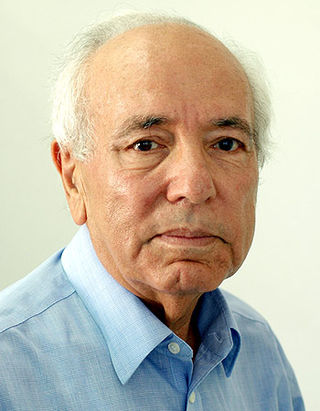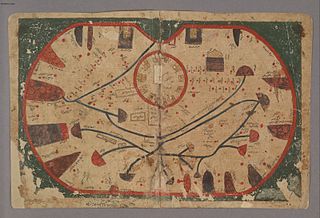Related Research Articles

The Nabataeans or Nabateans were an ancient Arab people who inhabited northern Arabia and the southern Levant. Their settlements—most prominently the assumed capital city of Raqmu —gave the name Nabatene to the Arabian borderland that stretched from the Euphrates to the Red Sea.

The Rasulids were a Sunni Muslim dynasty who ruled Yemen from 1229 to 1454.
Francis Edward Peters, SJ, was an American academic. He served as professor emeritus of history, religion and Middle Eastern and Islamic studies at New York University (NYU). He died on April 30, 2020, in hospice in Schenectady, N.Y..
Michael Bonner was a Jewish scholar of Islamic studies. Born in 1952, he died in May 2019. He received his PhD in Near Eastern studies from Princeton in 1987. He was a professor of medieval Islamic history at the University of Michigan, Ann Arbor, where he served as chair of the department of Near Eastern Studies from 2010 to 2019. In addition to his monographs, he published dozens of scholarly articles and translations.
John E. Woods is a Professor Emeritus of Iranian and Central Asian History in the Departments of History and of Near Eastern Languages and Civilizations and the College at the University of Chicago.
Mark R. Cohen is an American scholar of Jewish history in the Muslim world.
Jacob Lassner is an American writer and Jewish studies academic. He is the Philip M. & Ethel Klutznick Professor of Jewish civilization Emeritus at Northwestern University and former Director of the Crown Family Center for Jewish Studies. Lassner specializes in Medieval Near Eastern history with an emphasis on urban structures, political culture and the background to Jewish-Muslim relations.

Sasson Somekh was an Israeli academic, writer and translator. He was professor emeritus of Modern Arab Literature at Tel Aviv University.
Leon Carl Brown was a professor of history at Princeton University.

Guy Gedalyah Stroumsa is an Israeli scholar of religion. He is Martin Buber Professor Emeritus of Comparative Religion at the Hebrew University of Jerusalem and Emeritus Professor of the Study of the Abrahamic Religions at the University of Oxford, where he is an Emeritus Fellow of Lady Margaret Hall. He is a Member of the Israel Academy of Sciences and Humanities.
Dimitri Gutas is an American Arabist and Hellenist specialized in medieval Islamic philosophy, who serves as professor emeritus of Arabic and Islamic Studies in the Department of Near Eastern Languages and Civilizations at Yale University.
Al-Malik al-Aziz Sayf al-Islam Tughtakin Ahmad ibn Ayyub was the second Ayyubid emir (prince) of Yemen and Arabia between 1182 and 1197.
The following is a timeline of the history of the city of Aden, Yemen.
Khedouri Aboody Zilkha (1884–1956) was an Iraqi-Jewish banker.
Adam Sabra is Professor of History and King Abdul Aziz Ibn Saud Chair in Islamic Studies at the University of California, Santa Barbara.
Petra Marieke Sijpesteijn is professor of Arabic at Leiden University. She was the founding president of the International Society for Arabic Papyrology.
Marina Rustow is an American historian and the Khedouri A. Zilkha Professor of Jewish Civilization in the Near East at Princeton University. She is a 2015 MacArthur Fellow. Her work focuses on the study of Judeo-Arabic documents found in the Cairo geniza and the history of Jews in the Fatimid Caliphate.

Moshe Sharon is an Israeli historian of Islam.

The Book of Curiosities is an anonymous 11th-century Arabic cosmography from Fatimid Egypt containing a series of early illustrated maps of the world and celestial diagrams of the universe and sky. TheBook of Curiosities contains 17 maps in total, 14 of which are extremely rare not only in Islamic cartography but also in greater medieval map history. The cosmography includes the earliest recorded map of Sicily as well as a rectangular world map, considered the earliest surviving map with a graphic scale. The autograph manuscript has not survived, but the Bodleian Library of Oxford University acquired one of the only known copies of the manuscript in 2002, making its contents widely accessible today due to its digitization. Based on the production processes and physical materials of the copy, such as paper and pigment, scholars date the production of this copy to the early 13th century.
References
- 1 2 Abraham Udovitch. Department of Near Eastern Studies. Princeton University. Retrieved 25 November 2015.
- ↑ Abraham Udovitch. Archived 2018-10-12 at the Wayback Machine Right to Non-Violence. Retrieved 25 November 2015.
- ↑ University, Issues 75-81, Princeton University, 1978, p.19.
- ↑ Histories of the Middle East. Archived 2015-11-25 at the Wayback Machine Brill. Retrieved 25 November 2015.